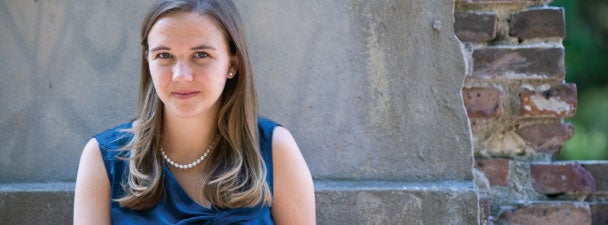
You don’t have to tell her that Rome wasn’t built in a day. If there’s one thing Melissa Huber ’11 has learned from studying ancient Rome and its building traditions, it’s just how long it takes to achieve something great. In her case, it took just over three years.
Huber’s list of achievements was already rich, but it was last January, when the American Philological Association selected her for its top national honor – the Lionel Pearson Fellowship – that she began to see how far all of her hard work would take her.
“It means great things for my career,” says Huber, who deferred her enrollment in Duke University’s Classical studies Ph.D. program until fall 2012 so that she could take advantage of the fellowship, which is funding a year of postgraduate work in the M.A. City of Rome program at the University of Reading in Berkshire, England, as well as two months of research in Rome. “The Pearson fellowship is providing a once-in-a-lifetime chance to hone my ancient language skills, study on site in Rome and make career-long connections with British scholars who research the city of Rome in particular – all before I begin my doctoral work. It will be an invaluable experience for my development as a scholar. The combined aspects of the prestige within the APA and the time I get to spend in Rome will be phenomenal for me.”

This will be the Honors College graduate’s second trip to the Eternal City; the first was the summer of 2010, when she spent five weeks studying Roman monuments and topography at John Cabot University and conducting field research of Augustan Rome’s public buildings and their civic functions.
“It’s thrilling to be standing there in those buildings, standing on the forum where all this ancient history was made,” recalls Huber, whose research abroad was funded by a Summer Undergraduate Research with Faculty grant and a William Aiken Fellows Summer Enrichment grant. “I would have never dreamed of doing the things that I’ve done if it weren’t for the College of Charleston. I couldn’t imagine going to another school and getting the kind of attention and experiences I’ve had here. I’m just so thankful for all the opportunities the College has given me – and not just abroad, but on campus, too.”
Back on campus after her trip to Rome, for example, Huber had the opportunity to help Darryl Phillips, the associate professor of Classics who nominated her for the Pearson fellowship, build a database of the buildings of the Augustan period, their historical data, architectural information and public functions.
“Working with the database allowed me to create graphical representations of the data and see trends that I would not have noticed otherwise,” says Huber. “It was kind of perfect for me, because – being a math major – I like to play with data.”
Huber, in fact, double-majored in mathematics and Classics – the latter of which she would’ve never dreamed she’d be interested in. She’d always wanted to be an engineer – or perhaps a medical doctor. It wasn’t until she took Phillips’ Roman history course her freshman year that she was remotely interested in Classics.
“And then everything just fell into place without me noticing it happen,” she shrugs. “It was like I was meant to study ancient Rome – like there was some force out there that knew that before even I did.”
There is, of course, no doubt about it now: For Melissa Huber, all roads lead to Rome.




